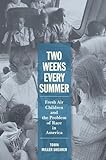Two Weeks Every Summer : Fresh Air Children and the Problem of Race in America / Tobin Miller Shearer.
Material type: TextSeries: American Institutions and SocietyPublisher: Ithaca, NY : Cornell University Press, [2017]Copyright date: ©2017Description: 1 online resource (264 p.)Content type:
TextSeries: American Institutions and SocietyPublisher: Ithaca, NY : Cornell University Press, [2017]Copyright date: ©2017Description: 1 online resource (264 p.)Content type: - 9781501708466
- African American children -- Social conditions
- Fresh-air charity -- United States
- African-American Studies
- Childhood Studies
- U.S. History
- HISTORY / United States / 20th Century
- Fresh Air organization, poverty, race, race relations, interracial liaisons, racial tension, racial politics, childhood reform efforts, children in civil rights activism, philanthropy
- 362.71
- HV934
- HV934
- online - DeGruyter
| Item type | Current library | Call number | URL | Status | Notes | Barcode | |
|---|---|---|---|---|---|---|---|
 eBook
eBook
|
Biblioteca "Angelicum" Pont. Univ. S.Tommaso d'Aquino Nuvola online | online - DeGruyter (Browse shelf(Opens below)) | Online access | Not for loan (Accesso limitato) | Accesso per gli utenti autorizzati / Access for authorized users | (dgr)9781501708466 |
Frontmatter -- Contents -- Preface -- Acknowledgments -- Introduction -- 1. Knowledge, Girl, Nature -- 2. Church, Concrete, Pond -- 3. Grass, Color, Sass -- 4. Sex, Seven, Sick -- 5. Milk, Money, Power -- 6. Greeting, Gone, Good -- Epilogue -- Appendix 1. Fresh Air Organizations -- Appendix 2. Documented Fresh Air Hosting Towns, 1939–1979 -- Notes -- Bibliographic Note -- Index
restricted access online access with authorization star
http://purl.org/coar/access_right/c_16ec
Two Weeks Every Summer, which is based on extensive oral history interviews with former guests, hosts, and administrators in Fresh Air programs, opens a new chapter in the history of race in the United States by showing how the actions of hundreds of thousands of rural and suburban residents who hosted children from the city perpetuated racial inequity rather than overturned it. Since 1877 and to this day, Fresh Air programs from Maine to Montana have brought inner-city children to rural and suburban homes for two-week summer vacations. Tobin Miller Shearer brings to the forefront of his history of the Fresh Air program the voices of the children themselves through letters that they wrote, pictures that they took, and their testimonials. Shearer offers a careful social and cultural history of the Fresh Air programs, giving readers a good sense of the summer experiences for both hosts and the visiting children. By covering the racially transformative years between 1939 and 1979, Shearer shows how the rhetoric of innocence employed by Fresh Air boosters largely served the interests of religiously minded white hosts and did little to offer more than a vacation for African American and Latino urban youth. In what could have been a new arena for the civil rights movement, white adults often overpowered the courageous actions of children of color. By giving white suburbanites and rural residents a safe race relations project that did not require adjustments to their investment portfolios, real estate holdings, or political affiliations, the programs perpetuated an economic order that marginalized African Americans and Latinos by suggesting that solutions to poverty lay in one-on-one acts of charity.
Mode of access: Internet via World Wide Web.
In English.
Description based on online resource; title from PDF title page (publisher's Web site, viewed 26. Apr 2024)


